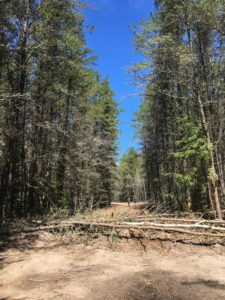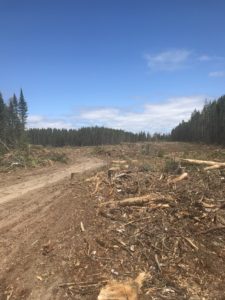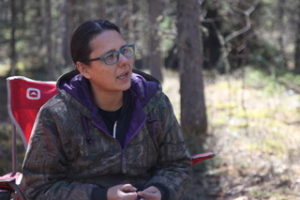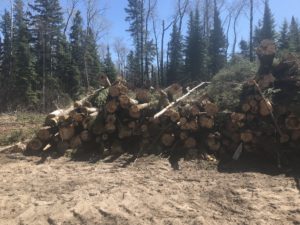In April, Dr. Peter Kulchyski and a few members of Wa Ni Ska Tan went up to Camp Morning Star on Hollow Water First Nation. The Camp was set up to delay and eventually stop the mining of Silica-rich sands. The site proposed by Canadian Premium Sands covers 300 acres and is to be used in various fracking operations across Canada. The land in question also houses numerous traplines for the community as well as habitat for moose and other wildlife in the area.
The first thing we saw upon arrival was the tent that housed the Sacred Fire. At that point the fire had been on for 90 days straight, tended by various people who frequented the camp but mostly by a quiet, soft-spoken fire keeper known as Bruce. We were also met by Lisa Raven and two other campers who sat and frequented the camp during the day.
During our conversation we learnt various troubling details about the consultation process. That the Chief and Council had essentially signed away the community members’ treaty rights, taking away the community members’ say in the matter. That the alleged consultation process included separated meetings for Women, Men, Elders and Youth with access to meeting minutes between groups denied. Meaning, each group could not know definitively what the other group had discussed and decided on. That the Environmental Report was completed with crucial components missing altogether. The entire process leading up to the point seems to have been lacking transparency and unscrupulous to say the least.
After a quick lunch, we took a 10 minute walk to the site in question. During the walk we saw various pole markers in the ground indicating pits that had been drilled and revealed sub-surface flow (running water underground). This raised another point of concern. The mining would inevitably contaminate the ground water within the community. When that happens, what is next for the community, will they also join the growing list for ‘Boiled Water Advisory’?
As we approached the end of the tree line, the difference could not have been more startling. Behind us was a lush, healthy and mature forest with everything from tall trees to lush undergrowth and signs of animal dwellings. Before us was vast land that had been cleared not more than a few weeks prior. In a last ditch effort to show progress of the project, CPS had contracted a company to clear the wooded area under a timber licence. Members of the camp describe the proceedings in an apocalyptic fashion with all manner of animals fleeing from the site and rushing past the camp as their homes were destroyed. Now the land stands barren and desolate with a few signs of animals passing through. A sad reality.
Sadie went off with Drey Smith, who started the camp and called it Camp Morning Star after his four times Great Grandfather. He showed around the area, the perimeter and the alternative access trails that CPS was building to service the area. During the drive, they spotted more than one set of moose tracks close to the main access road. Having worked for CPS, Drey has insider knowledge of their cutting corners and lack of following Manitoba Conservation Laws. Drey told the story of how he worked for CPS and how his son saw the devastation of the clear cutting and got upset with him, this caused him to quit his job in December of 2018 and to start the camp in February 2019.
The camp was clearly set up and run by people who care about the land, waters, animals and plants in the area. By people who are looking into the future to protect future generations.


Before and After shots showing the clearing of the proposed site.

Lisa Raven Speaking on the issues surrounding the project.

A pile of logs left behind in the clearing process.

